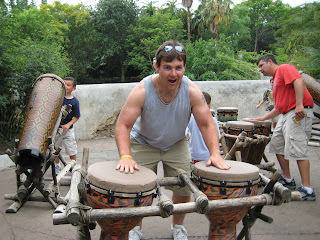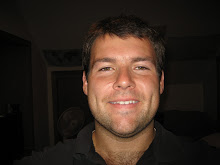
My name is Derrick Antoniak, and this is my blog about being a first-year medical student.
So, the first core of medical school is anatomy, and it lasts 10 weeks. This was week 10.
We finished dissecting the lower limb and spent the rest of the week studying. It was actually an interesting week outside all the studying. On Tuesday we had the first meeting of the 'Medical Humanities group', which was only attended by about 8 people. We read and discussed passages from Walt Whitman's "I Sing the Body Electric", which actually had relevance to our anatomy experience and the field of medicine in general. Whitman was a nurse during the Civil War, and probably had to detach himself somewhat in order to do his job, much like we focus on learning anatomy to forget about the fact that the cadaver we are dissecting was a person with a family and a job and hobbies and emotions and worries and strengths and weaknesses of character and all those other things that make us human. Good poem, though, if you ever have a chance to google it. The lady presenting the poem talked about the book Body of Work by Christine Montross, which I read over the summer and have been meaning to dedicate an entire blog to at some point. If anyone really wants to know what the first year of med school is like (or at least anatomy), I think her book is right on point and a good read for anyone.

Also on Tuesday, my mother's significant other had an aneurysm in his brain operated on, so she's been staying at the hospital, and I've been staying at her house with Harry. Sadly, Harry, who never used to leave my side when he lived with me and followed me everywhere, doesn't even like me that much anymore. He's also gained about 20 pounds in the two months he's been living here, not surprising given my mother's track record of fattening up her pets.
I also signed up for the student senate elections this week, so I'll spend the next two weeks campaigning and hopefully get elected. I also went to an informational meeting for this honors program called EMET on Wednesday, so hopefully between those two things I'll be able to keep busy outside of class.
My grandpa moved from Fremont to Bellevue and is living at the new Eastern Nebraska Veterans Home, and I went to visit him yesterday. Here he is looking out the window, which I am convinced he does whenever I'm not there, because that's what he's doing every time I arrive.
Here's a picture of the two of us. We pretty much just walk laps whenever I'm there, and I ask him lots of questions, and he gives me mostly one or two word responses. The weather was phenomenal yesterday, though, so we took a walk outside.
I took Harry home with me yesterday, and we ran into my other grandpa, who lives next door but still only sees me every few weeks. I thought long and hard about this last night, because there are people a lot younger than me that never have the opportunity to see both grandpas in the same day, much less on a normal Saturday afternoon without it being a holiday or special occasion. Grandpa had his tree groomed over the summer, and now it is turning the most beautiful colors, so he wanted me to take a picture of it. That's him in the foreground, and those bland yellow trees in the background are the ones in my front yard.

So, that's how I celebrated the end of anatomy. Visited with both grandpas, went to dinner with Joanna, and watched some football from the comfort of my mother's couch. Unfortunately, the College of Medicine didn't give us much time to revel in our accomplishments, as they handed out the note packets for core 2 on the way in the door for the last exam of core 1. I'm going to try to relax a bit today, but at some point I'll end up in the library studying for the clinical exam coming up this next Saturday and previewing for tomorrow's first lecture of Core 2: Cellular Processes.

















